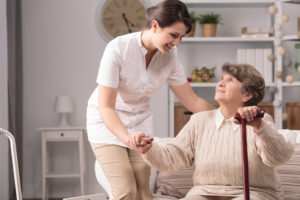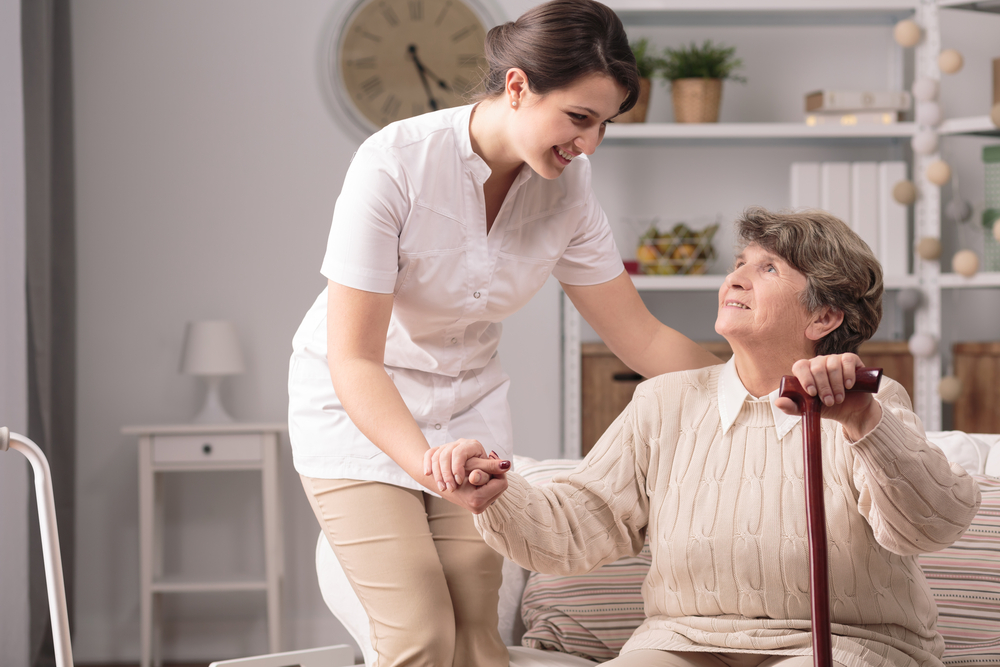Caring for others is a rewarding profession, with approximately one million caregivers in New York alone. Whether an ‘informal’ family caregiver or a caregiver for a non-relative, there are a few paths to the caregiving field. This article will discuss the different types of caregiving, and provide everything you need to keep in mind when becoming a caregiver for a non-relative.
 What is a Caregiver?
What is a Caregiver?
Simply put, a caregiver is someone who looks after another individual who needs assistance. This can range from companionship to help with personal hygiene, housekeeping, and more. A person would require the help of a caregiver if they are ill, disabled, or frail and need assistance in remaining as independent as possible, without transferring to a nursing home.
What is a Family Caregiver?
A family caregiver is anyone providing care to a blood relative or relative via marriage. People often fall into the category of ‘family caregiver’ in the case of aging parents who need more help, or if a loved one has fallen ill, and would prefer to be the caregiver over sending their family member to a nursing home.
Family caregivers juggling their own families and work responsibilities can get paid as part of the CDPAP program, a Medicaid-funded program that pays family members to care for their loved ones. With the help of a competent CDPAP agency, family caregivers can easily get compensated for their services, while being able to personally take care of their loved ones from the comfort and familiarity of their home.
What is a Non-Relative Caregiver?
Non-relative caregivers are exactly as they sound — someone who provides care to an individual unrelated by blood or by marriage. A non-relative caregiver can be hired personally by an individual and their family, or through a home healthcare agency and can carry out services within the individual’s home or a facility.
Non-relative caregivers are able to provide support to individuals who have no other family to take care of them or can provide respite to family members who are caring for a loved one.
Non-relative caregivers are referred to in many different ways. Here are some other common titles that refer to a non-relative caregiver:
- Home Health Aide
- Home Care Assistant
- Certified Nursing Assistant (CNA)
- Hospice Caregiver
- Direct Support Professional (DSP)
- Direct Care Worker
- In-Home Supportive Services (IHSS) Provider
- Companion Caregiver
- Personal Care Aide
- Respite Care Provider
- Live-In Caregiver
- Care Technician
- Personal Attendant
- Care Specialist
How to Become a Caregiver
There are several steps you can take to start your caregiving career:
Get experience
Working out in the healthcare field will give you the practical experience of working with patients and individuals who need care. Nursing homes, home care agencies, and hospitals are all ideal places to gain the relevant practice you need to become an experienced caregiver.
Grow knowledge and skills
Attending continuous educational courses keeps you fresh and up-to-date with the evolving healthcare industry, its technologies, and best practices.
Pass a criminal background check
You may be required to pass a background check to ensure you have no criminal record that would disqualify you from providing care.
Qualifications for Caregivers
Depending on the type of care you’re providing, or if you’re specializing in the caregiving field, you may be required to have specialized training, education, certifications, or licenses. It’s important to find out what qualifications employers are looking for when becoming a caregiver. The most common qualifications for caregivers are:
First Aid and CPR certification
Caregivers with education and training in first aid and CPR can respond to emergencies and assist in urgent situations.
Home Health Aid (HHA) certification
A certified HHA is trained to provide assistance with personal care, including bathing, dressing, toileting, etc. as well as housekeeping and house management.
Certified Nursing Assistant (CNA) certification
This means caregivers have specialized training in health care and personalized care and can assist under a licensed nurse’s supervision.
Driver’s license
A driver’s license is preferred by some employers, in the event caregivers need to run errands or transport individuals to appointments.
Medication Administration certification
This ensures any medications being administered to individuals are being done so safely.
Background check
A clear background check shows caregivers have no record of improper behaviors like abuse or violence.
How Do I Get Paid as a Non-Relative Caregiver?
While family caregivers in New York can be paid for their services via state programs, non-relative caregivers can be paid through a variety of methods, including hourly wages, and salary, or through government programs like the Nursing Home Transition and Diversion (NHTD) Program.
You can find out more about getting paid a caregiver by contacting a home healthcare agency like Americare, and find more job opportunities through nursing home facilities, agencies or families looking to hire a caregiver.
Benefits of Being a Non-Relative Caregiver
While individuals may be considering family caregivers to handle their care, there are a few key benefits a non-relative caregiver has over family caregivers:
Official training and experience
Non-relative caregivers can typically offer a higher quality of care based on their experience in the healthcare industry and the training obtained.
Boundaries
Family caregivers tend to get more emotionally involved when providing care services. Non-relative caregivers can keep professional boundaries with those seeking care, preventing personal conflicts that might otherwise arise.
Healthcare growth
Non-relative caregivers often have more resources and access to the latest healthcare trends and technologies, allowing them to evolve and up their knowledge, resulting in updated healthcare practices.
Americare Can Help
There are many opportunities and avenues you can take when becoming a non-relative caregiver. At Americare, we help home caregivers in New York understand the requirements, resources, and job opportunities available to them.
If you’re considering becoming a non-relative caregiver, reach out to us today to discuss your options and get started!

